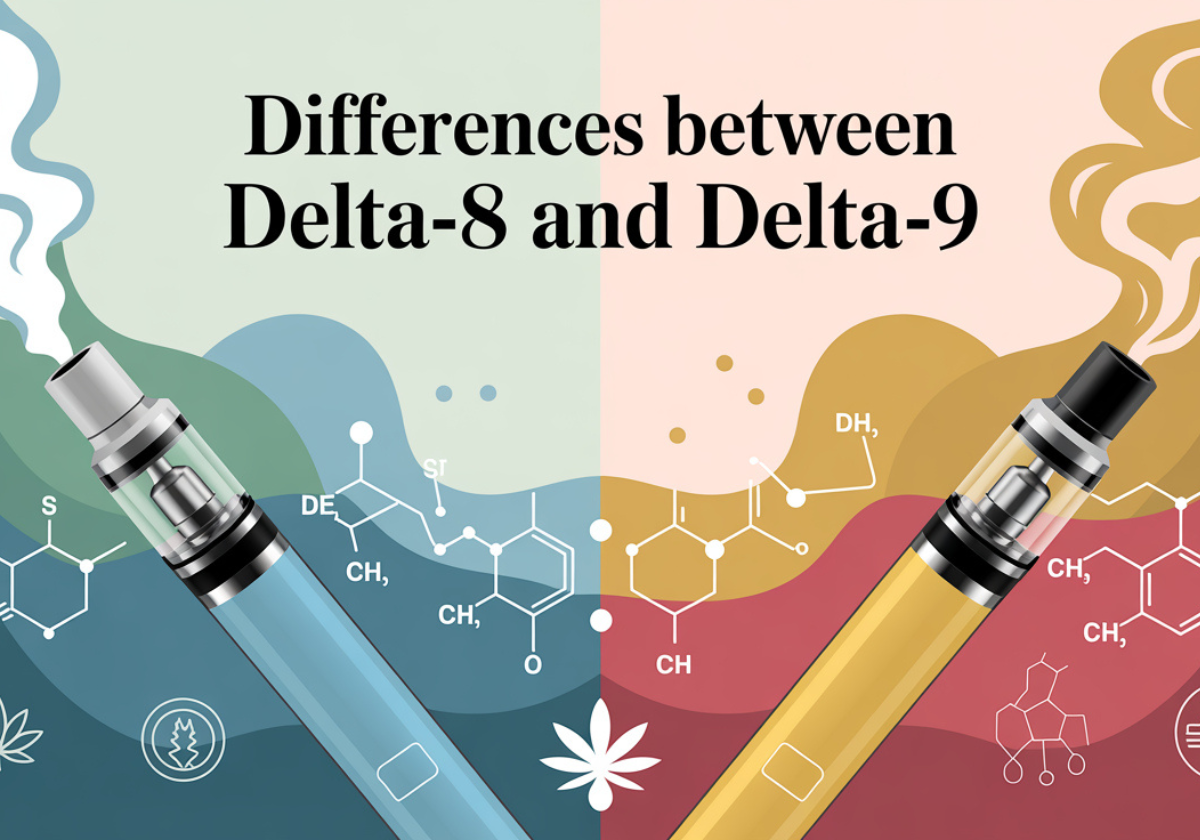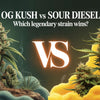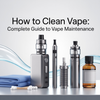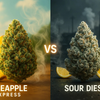Differences Between Delta 8 and Delta 9

The cannabis industry has exploded with options lately, and two compounds keep popping up everywhere: Delta 8 and Delta 9 THC. If you've found yourself standing in a dispensary or scrolling through an online store wondering which one to choose, you're not alone. These two cannabinoids might sound similar, but they deliver distinctly different experiences.
So, what's the real difference between Delta 8 and Delta 9? Beyond the numbers in their names, these THC variants differ in potency, effects, legal status, and how they make you feel. Whether you're curious about a milder buzz or looking for something more powerful, understanding these differences will help you make the right choice for your needs. Let's break down everything from their chemical structures to their effects, legality, and safety profiles.
What is Delta 8 THC?
Delta 8 THC is a naturally occurring cannabinoid found in cannabis and hemp plants, though it exists in very small amounts. Because of this scarcity, most Delta 8 products on the market are actually hemp-derived—manufacturers extract CBD from hemp and chemically convert it into Delta 8 through a process called isomerization.
Users describe the Delta 8 THC mild high as noticeably gentler than traditional cannabis. It tends to produce a clear-headed buzz with relaxation and focus rather than overwhelming intoxication. Many people turn to Delta 8 when they want to unwind without feeling completely zonked out or anxious.
You'll find Delta 8 in various forms: gummies, 1 gram vape cartridges, tinctures, and edibles. Since it's typically derived from hemp (which contains less than 0.3% Delta-9 THC), it exists in a legal gray area that's made it widely available, even in states with strict cannabis laws.
What Are Potential Benefits of Using Delta 8?
People who use Delta 8 regularly report several appealing benefits. The most common reason folks reach for it is relaxation without the intensity that sometimes comes with stronger THC products. It seems to take the edge off stress and anxiety while keeping your mind relatively clear.
Other potential benefits include appetite stimulation—yes, the munchies are real but usually milder than with Delta-9. Some users find it helps with mild discomfort or occasional sleeplessness. The gentle euphoria can lift your mood without sending you into orbit, making it popular for daytime use or social situations where you want to feel good but stay functional.
Because the psychoactive effects are more subtle, many people appreciate that they can dose Delta 8 and still handle daily tasks without feeling impaired.
What Are Potential Side Effects of Delta 8?
Even though Delta-8 is milder, it's not without side effects. The most commonly reported issues are pretty standard for cannabinoids: dry mouth (cotton mouth is real), red or dry eyes, and mild drowsiness, especially at higher doses.

Some users experience slight dizziness or confusion, particularly when they're new to cannabinoids or take more than their tolerance allows. With regular use, you might build up a tolerance, meaning you'll need more Delta-8 to achieve the same effects over time.
It's worth noting that because Delta-8 products aren't as strictly regulated as pharmaceutical drugs, quality can vary significantly between brands. Poorly made products might contain contaminants or inaccurate potency labels, which could lead to unexpected effects.
How Is Delta-8 Consumed?
Delta-8 comes in several consumption methods, each with its own onset time and duration:
Vaping is one of the fastest ways to feel effects—usually within minutes. Delta-8 vape cartridges heat the compound into vapor you inhale, and the effects typically last 2-3 hours.
Edibles and gummies take longer to kick in (anywhere from 30 minutes to 2 hours) because they need to pass through your digestive system first. However, the effects tend to last much longer—often 4-6 hours or more.
Tinctures are liquid extracts you place under your tongue. This sublingual method falls somewhere in the middle for onset time (15-45 minutes) since some absorption happens directly through the mucous membranes in your mouth.
Capsules work similarly to edibles, passing through your digestive system before taking effect.
Will Delta-8 Show Up in a Drug Test?
Here's where things get tricky: yes, Delta-8 will likely show up on a drug test. Standard drug screenings don't distinguish between different types of THC—they're looking for THC metabolites in general. When your body processes Delta-8, it breaks down into metabolites that are virtually identical to those produced by Delta-9 THC.
So if you're subject to drug testing for work, sports, legal reasons, or anything else, using Delta-8 products carries the same risk as using Delta-9. The test can't tell the difference, and neither can whoever's reviewing your results. If staying clean for drug tests matters to you, it's best to avoid Delta-8 entirely — even if you’re browsing an online Delta vape shop for other options.
Is Delta-8 Legal in Texas?
Texas has one of the more complicated relationships with Delta-8. Technically, hemp-derived Delta-8 THC became federally legal under the 2018 Farm Bill, which legalized hemp and its derivatives containing less than 0.3% Delta-9 THC. Since Delta-8 can be derived from legal hemp, many retailers sold it freely across Texas.
However, Texas has attempted to restrict Delta-8 specifically. The Texas Department of State Health Services initially classified Delta-8 as a Schedule I controlled substance in 2021, but a court injunction blocked that rule. As of now, Delta-8 exists in a legal gray area in Texas—it's available in many stores and online, often alongside popular strains like Blue Dream vape and other hemp-derived products, but the state hasn't given up on trying to regulate or ban it.
The safest approach? Check the most current Texas laws before purchasing, and buy only from reputable retailers who provide lab testing and comply with whatever regulations are currently in effect.
What is Delta-9 THC?
Delta-9 THC is the main psychoactive compound in marijuana—the classic THC that people have been talking about for decades. Unlike Delta-8, which exists in tiny amounts naturally, Delta-9 is abundant in cannabis plants and is what causes the traditional marijuana high.
This is the cannabinoid that interacts strongly with CB1 receptors in your brain and nervous system, producing everything from euphoria and relaxation to altered perception and increased appetite. When someone mentions "THC" without specifying which type, they're almost always referring to Delta-9.
Delta-9 occurs naturally in cannabis plants, especially in marijuana strains bred specifically for higher THC content. Some hemp-derived products also contain small amounts of Delta-9 (staying under that 0.3% threshold to remain federally legal), but these typically deliver much milder effects than marijuana-derived Delta-9 products.
What Are Potential Benefits Of Using Delta-9 THC?
Delta-9 THC has been studied more extensively than other cannabinoids, and users report a wide range of benefits. Many turn to Delta-9 for pain relief, particularly chronic pain that hasn't responded well to other treatments. The compound's ability to alter pain perception can provide significant relief.
The stronger euphoria Delta-9 produces can be beneficial for mood—helping with stress, depression, and general enjoyment of life. It's also popular as a sleep aid, particularly at higher doses, because it can help quiet racing thoughts and relax your body.
Medical marijuana patients often prefer Delta-9 for managing symptoms like nausea (especially from chemotherapy), lack of appetite, muscle spasms, and anxiety. The more potent effects mean a little goes a long way for therapeutic purposes.
Recreationally, people appreciate the enhanced sensory experiences, creativity, social enjoyment, and deep relaxation that Delta-9 can provide.
What Are Potential Side Effects of Using Delta-9 THC?
With greater potency comes a longer list of potential side effects. While many people tolerate Delta-9 well, it can cause uncomfortable experiences, especially at high doses or for inexperienced users.
Common physical side effects include dry mouth, red eyes, increased heart rate, and coordination issues. Some people experience dizziness or feel physically heavy and sedated.

The psychological side effects are where Delta-9 really distinguishes itself from Delta-8. Anxiety and paranoia are relatively common, particularly in people who are prone to these feelings or who consume too much. Some users report impaired short-term memory, confusion, or uncomfortable alterations in time perception.
At very high doses, Delta-9 can occasionally trigger more intense reactions like panic attacks or, in rare cases, hallucinations. These effects are temporary but can be frightening in the moment.
What is Delta-9 THC Distillate?
Delta-9 THC distillate is essentially pure, concentrated Delta-9 that's been refined through a distillation process. Think of it as the liquor of the cannabis world—where flower might be like beer, distillate is more like vodka.
This thick, amber-colored oil can contain 90-99% THC, making it incredibly potent. Because it's so pure, distillate is flavorless and odorless, which makes it perfect for manufacturers creating edibles, cheap carts thc, and dab products where they want precise THC content without plant taste.
People who dab (vaporize concentrates) often use distillate because it delivers powerful effects quickly. It's also popular for making homemade edibles since the THC is already activated (decarboxylated) and ready to bind with fats.
Just remember: distillate's extreme potency means a little goes a very long way. It's definitely not the place to start if you're new to cannabis.
Key Differences Between Delta-8 and Delta-9 THC
Chemical Structure
At the molecular level, Delta-8 and Delta-9 are nearly identical twins. Both are forms of tetrahydrocannabinol with the same number of atoms arranged in almost the same way. The only difference? The location of a single double bond in their chemical structure.
Delta-8 has this double bond on the eighth carbon chain, while Delta-9's sits on the ninth carbon chain. That tiny shift might seem insignificant, but it dramatically changes how these molecules interact with your body's endocannabinoid system—specifically how tightly they bind to CB1 receptors in your brain.
This structural difference is why Delta-9 produces stronger psychoactive effects while Delta-8 delivers a gentler experience. It's a perfect example of how small chemical variations can create big differences in real-world effects.
Potency and High
Is Delta-8 stronger than Delta-9? No—Delta-9 is definitely the more potent of the two. Most users and researchers estimate that Delta-8 is roughly 50-70% as potent as Delta-9, though individual experiences vary.
The Delta-8 vs Delta-9 high feels distinctly different. Delta-8 users typically describe a smooth, clear-headed buzz that's relaxing without being overwhelming. You might feel mellowed out and slightly euphoric, but you can still think clearly, hold conversations, and function reasonably well—similar to how many people describe the calming effects of indica carts.
Delta-9 produces a more intense, full-body high with stronger mental effects. Colors might seem brighter, music more engaging, and funny things funnier. You're more likely to feel "stoned" in the traditional sense—possibly couch-locked, definitely more impaired, and sometimes experiencing that time-slowing sensation.
For comparison, if Delta-8 is like having a couple of beers, Delta-9 is more like several cocktails. Both get you there, but the journey and destination feel different.
Side Effects
The side effect profiles mirror the potency difference. Delta-8's milder effects mean milder side effects for most people. You might get cotton mouth and red eyes, feel a bit tired or hungry, but you're less likely to experience anxiety, paranoia, or that overwhelming "too high" feeling.
Delta-9's stronger high comes with a higher risk of uncomfortable psychological effects. Anxiety and paranoia are much more common, especially for people who are sensitive to THC or consume more than their tolerance allows. The cognitive impairment is also more pronounced—you might genuinely struggle with memory, concentration, or coordination, particularly when using potent strains or products like a pineapple express vape.
That said, everyone's endocannabinoid system is unique. Some people handle Delta-9 beautifully while Delta-8 makes them anxious, though that's less common.
Duration of Effects
How long each lasts depends more on consumption method than which type of THC you're using, though Delta-9 effects may linger slightly longer due to its potency.
Vaping either compound produces effects that peak quickly (within 10-15 minutes) and fade after 2-3 hours.
Edibles are a different story entirely. Whether you're eating Delta-8 or Delta-9 gummies, expect to wait 30 minutes to 2 hours before feeling anything. Once the effects kick in, though, they can last 4-8 hours or even longer. Delta-9 edibles often produce longer-lasting effects than Delta-8 edibles at equivalent doses.
Tinctures fall somewhere in the middle—effects begin in 15-45 minutes and last 3-5 hours on average.
Delta-8 vs Delta-9 Legality
The legality of Delta-8 vs Delta-9 under the 2018 Farm Bill is where things get genuinely confusing. Federally, marijuana (cannabis with more than 0.3% Delta-9 THC) remains a Schedule I controlled substance. However, the 2018 Farm Bill legalized hemp (cannabis with 0.3% Delta-9 THC or less) and explicitly legalized "all derivatives, extracts, cannabinoids" from hemp.
This created a loophole that Delta-8 manufacturers drove a truck through. Since Delta-8 can be synthesized from legal hemp-derived CBD, they argue it's a legal hemp product. Many brands even offer Delta-8 in multiple forms — from edibles to hybrid carts that blend different strains for balanced effects. The DEA and FDA haven't fully bought this argument, but they also haven't aggressively cracked down on Delta-8 sales.
Meanwhile, Delta-9 THC from marijuana remains federally illegal, though it's legal for medical or recreational use in many states. Confusingly, hemp-derived Delta-9 products (containing less than 0.3% by dry weight) are technically federally legal under the same Farm Bill.
State-level laws vary wildly. Some states have fully legalized all THC products. Others have banned Delta-8 specifically while keeping Delta-9 illegal. A few allow hemp-derived Delta-8 but not marijuana-derived Delta-9.
Is Delta-8 legal but Delta-9 illegal? It depends entirely on where you live. States like Alaska, Colorado, Delaware, Idaho, Montana, New York, Rhode Island, Vermont, and Washington have restricted or banned Delta-8. Other states regulate it differently or allow it completely.
Your best bet is checking your specific state's current laws before purchasing either compound.
Medical and Recreational Uses
Delta-8 and Delta-9 serve different purposes depending on what you're looking for.
Delta-8 shines for:
- Managing mild anxiety without strong intoxication
- Daytime relaxation and focus
- Gentle appetite stimulation
- Sleep support without heavy sedation
- Situations where you want subtle relief but need to remain functional
Delta-9 is better for:
- Significant pain relief
- Managing severe nausea or lack of appetite (like in chemotherapy patients)
- Addressing serious sleep issues
- Stronger recreational experiences
- Conditions requiring more potent therapeutic effects
Medical marijuana patients typically prefer Delta-9 because its stronger effects mean better symptom management at lower doses. However, people sensitive to THC's psychological effects might find Delta-8 provides a therapeutic middle ground.
Drug Testing and Safety Concerns
Both Delta-8 and Delta-9 will show up on standard drug tests—there's no way around it. Drug screenings look for THC metabolites, and both compounds produce similar breakdown products in your body. Can you fail a drug test with Delta-8? Absolutely.
If you're subject to testing, assume that using either product will cause you to test positive. The legal status of what you used won't matter; the test simply shows THC presence.
Safety concerns with both compounds include:
Product quality: Neither Delta-8 nor Delta-9 products are FDA-regulated for safety and effectiveness. This means contamination, inaccurate labeling, and harmful additives are real risks. Always purchase from reputable brands that provide third-party lab testing (Certificates of Analysis).
Tolerance and dosage: Start low and go slow with either compound. Building tolerance over time is real, and taking too much can lead to unpleasant experiences.
Driving and operating machinery: Don't. Both compounds impair your coordination, reaction time, and judgment.
Medical interactions: THC can interact with certain medications and conditions. Talk to a healthcare provider if you're managing health issues or taking other drugs.
Is Delta-8 or Delta-9 Best for You?
Choosing between Delta-8 and Delta-9 comes down to your experience level, tolerance, desired effects, and legal situation.

Delta-8 might be your best bet if you:
- Are new to THC products
- Want relaxation without intense intoxication
- Have experienced anxiety or paranoia with stronger cannabis
- Need to stay somewhat functional while using
- Live somewhere Delta-9 is illegal but Delta-8 is available
- Want a gentler introduction to cannabinoids
Delta-9 might be better if you:
- Have experience with THC and know your tolerance
- Need stronger effects for pain, sleep, or other symptoms
- Enjoy a more intense recreational experience
- Have tried Delta-8 and found it too mild
- Have legal access through medical or recreational marijuana programs
- Are looking for classic cannabis effects
Is Delta-8 better for anxiety than Delta-9? Generally, yes. The milder psychoactive effects mean less risk of triggering anxiety or paranoia, though everyone responds differently.
What's the best choice for beginners: Delta-8 or Delta-9? Most experts recommend starting with Delta-8. Its gentler effects give you a chance to understand how your body responds to THC without jumping into the deep end. You can always move to Delta-9 later if you want stronger effects.
FAQs About Delta-8 vs Delta-9
Is delta-9 THC legal in Texas?
Hemp-derived Delta-9 products containing less than 0.3% Delta-9 THC by dry weight are federally legal and available in Texas. However, marijuana-derived Delta-9 remains illegal in Texas except for very limited medical use through the state's Compassionate Use Program. The laws are complicated and subject to change, so check current regulations.
Is delta-9 THC safe?
Delta-9 is relatively safe for most adults when used responsibly, but it's not without risks. Side effects can include anxiety, impaired coordination, and increased heart rate. Long-term heavy use may affect memory and motivation. The biggest safety concern is product quality—unregulated products may contain contaminants. Stick with lab-tested products and avoid driving or operating machinery while impaired.
Is delta-8 stronger than delta-9?
No, Delta-9 is stronger. Delta-8 produces about 50-70% of the potency of Delta-9, delivering a milder, more manageable high for most users.
What is the difference between delta-8 and delta-9 THC?
The difference between Delta-8 and Delta-9 comes down to a slight variation in chemical structure (the position of a double bond), which affects potency and effects. Delta-9 is more potent and produces stronger psychoactive effects, while Delta-8 delivers a gentler, clearer-headed experience. They also differ in legal status and how they're typically produced.
Does delta 9 have THC?
Delta-9 is THC—it's the primary form of tetrahydrocannabinol and what people typically mean when they say "THC." So yes, Delta-9 products contain THC by definition.
What is delta-9 THC?
Delta-9 THC is the main psychoactive cannabinoid found naturally in cannabis plants. It's responsible for the classic marijuana high and has been used both recreationally and medicinally for thousands of years. It works by binding to cannabinoid receptors in your brain and body.
What is delta-9 THC distillate?
Delta-9 distillate is a highly concentrated, purified form of Delta-9 THC (typically 90-99% pure). It's produced through distillation and used in vape cartridges, edibles, and dabs. The extreme potency makes it suitable for experienced users but overwhelming for beginners.
How Is Delta-9 Consumed?
Delta-9 can be smoked (flower), vaped (cartridges or concentrates), eaten (edibles and gummies), taken sublingually (tinctures), applied topically (creams and balms), or consumed as capsules. Each method has different onset times and durations of effects.
Is Delta-9 safe?
For most healthy adults using it responsibly, Delta-9 is relatively safe, though it carries more side effect risks than Delta-8. The main concerns are psychological effects (anxiety, paranoia), impaired coordination, and product quality. People with heart conditions, mental health issues, or who are pregnant should avoid it. Always start with low doses and purchase from reputable, lab-tested sources.
Will Delta-9 Show Up on a Drug Test?
Yes, Delta-9 will absolutely show up on standard drug tests. Drug screenings specifically look for THC metabolites, and Delta-9 produces these in your system. If you're subject to testing, using Delta-9 will likely result in a positive test.
Is Delta-9 Legal in Texas?
Marijuana-derived Delta-9 THC is illegal in Texas for recreational use and only available for very limited medical conditions through the state's Compassionate Use Program. However, hemp-derived Delta-9 products containing less than 0.3% Delta-9 THC are federally legal and available in Texas under the 2018 Farm Bill.
Are Delta-8 And Delta-9 THC Legal in All 50 States?
No, neither is legal everywhere. Delta-9 from marijuana is illegal at the federal level but legal in some states for medical or recreational use. Hemp-derived Delta-9 (under 0.3%) is federally legal but banned in some states. Delta-8 exists in a legal gray area—federally it's arguably legal as a hemp derivative, but many states have specifically banned or restricted it. Always check your local laws before purchasing.
Conclusion
The difference between Delta-8 and Delta-9 ultimately comes down to intensity and experience. Delta-8 offers a smoother, milder high that keeps you functional and clear-headed—perfect for people who want relaxation without feeling overwhelmed. Brands like Delta King highlight these qualities by offering Delta-8 products designed for balance and everyday use. On the other hand, Delta-9 delivers that classic, more intense marijuana high with stronger psychoactive effects that can be therapeutic or recreational depending on your needs.
When deciding between the two, consider your tolerance level, what effects you're after, and the legal landscape where you live. Beginners and those sensitive to THC's psychological effects will likely appreciate Delta-8's gentler touch. Experienced users seeking stronger relief or more potent recreational effects will probably prefer Delta-9.
Whatever you choose, prioritize safety by purchasing lab-tested products from reputable sources, starting with low doses, and using responsibly. Neither compound is "better" than the other—they simply serve different purposes. Understanding these differences helps you make an informed choice that matches your individual needs and circumstances.





